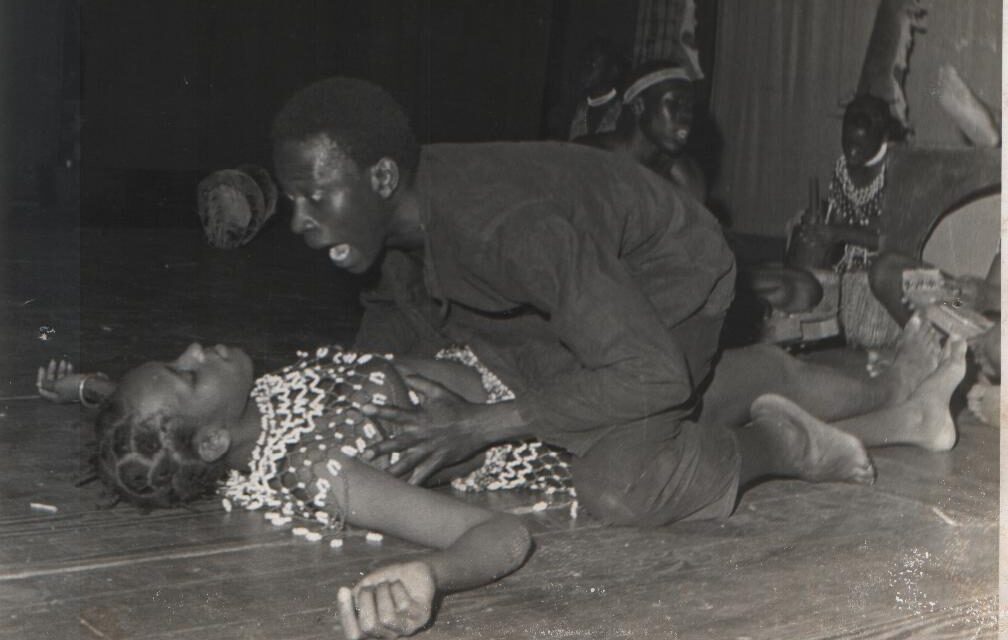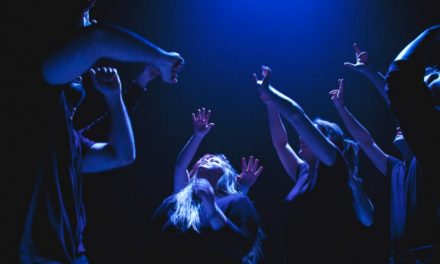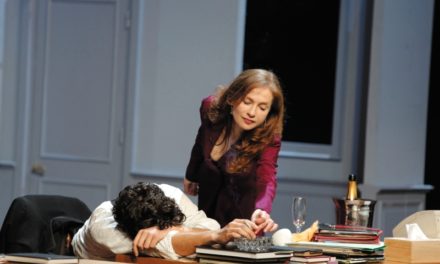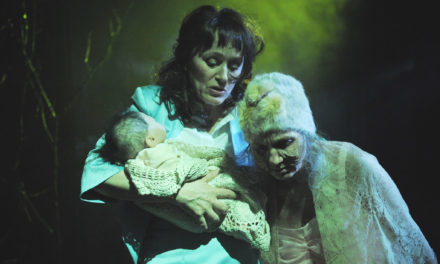When Abafumi went on what would be their last tour, Robert Serumaga, who had not gone with his company on the Italian tour, was back in Kenya fighting Uganda’s ‘return to the shadows’. Not with his pen but with an AK-47. Ironically, it was not to the rifle that he lost his life. But this is a story that needs to be told from the start.
The early post-colonial theatre in Africa was stubbornly interlocked with politics. While African artists who sought political correction in theatre might have been successful on stage, the meeting between politics and theatre was fatal offstage. There, away from the glitz of theatre lights and the glare of audiences, necks were wrung, heads squashed, and limbs chopped into cannibalistic, chewable pieces. It was that brutal.
For others, like Robert Serumaga, the pantheon of Uganda’s theatre in the ‘70s, the murder was as arcane as dropping a lethal potion into their drink. Tomorrow they may as well say he died of any of the 3Ws: Women, Weed, or Wine. ‘Nobody’ was there after all. But the Walls (another W!) have ears. And eyes too!
Inside the Walls of Death
It is now 40 years since Serumaga went to that land of the dead where, in the minds of the Baganda, people lie on their backs like boats to watch over the living. We shall tell you what the walls told us so that you, you yourself, can see what happened before the grand boat left ashore.
The place is a quiet neighborhood in Nairobi. Residential status? Exile. It is some day in September 1980. A beautiful woman pays Serumaga a visit. The following day? His story ends. The autopsy said aneurysm. Maybe, just maybe, the truth shall be found out, one day.
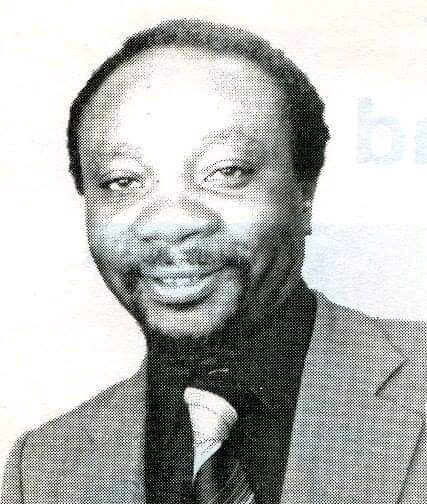
Robert Serumaga, founder of the Abafumi Company in Uganda. Photo from the original article.
Serumaga (until April 1980, a Ugandan cabinet minister in the post-Amin government) had been living in Kenya. He was involved in insurrectionary activities against the Ugandan government. He was purportedly receiving funding from the CIA for his rebel strategy. It was the second time. The first in 1979 against Idi Amin was successful. This was not. It fell into governmental ears. ‘Serumaga’s artistic and military credentials must have been a constant source of unease to many powerful individuals in Uganda such as Cabinet Minister Paulo Muwanga and the Army Chief of Staff, Brigadier David Oyite Ojok, considered by many to have been Milton Obote’s right-hand man’, writes Dr. George Seremba, whose Ph.D. thesis is on the subject of Serumaga.
How a very accomplished, brilliant artist dropped the pen and picked the gun is uncannily disturbing. How the body of a theatre luminary, whose writing, acting, and directing skills had drawn global attention to Uganda’s theatre, could be deflated to lifelessness at the mean age of 41 is haunting. We can only hide that guilt in the consolation that at the time of his death, in a career that spanned ten active years, Robert Serumaga bequeathed a novel and five plays to his audiences. And boy, what an artistic legacy!
Surprisingly, directing and standing before audiences to ‘make-believe’ had not been his childhood dream. It was standing at the altar, holding the chalice and giving Holy Communion that the early formative years had had Serumaga cut out for.
The Collar Didn’t Fit; the Costume Would
He was christened Roberto Bellarmine after an Italian priest that had been canonized on January 6th, 1939 – the very day Serumaga was born. His father, Thomas Kyakwambala, a propertied chief in Buganda, was already in his sixties and at the blink of losing his sight when the boy came into the family. Four years later, Serumaga lost his father.
As a result, his mother, Geraldine Namatovu, was forced out of her deceased husband’s home by her in-laws. Namatovu resolutely held her son by the hand and left for her birthplace in Villa Maria, in Masaka, Central Uganda. Until late into his teens, when Serumaga reunited with his paternal family, his mother and her five sisters, one of them a nun, were his closest blood ties. Seremba attributes the ‘recurring wry humor, inhumanity, greed, loneliness and despair’ in Serumaga’s work to the writer’s childhood experiences.
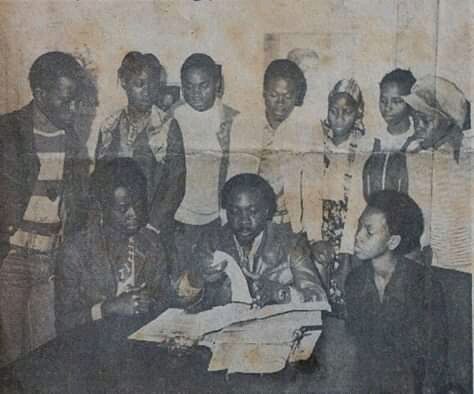
Robert Serumaga (center) with members of his company, Abafumi. Photo: The African Theatre Magazine
His mother could have wished him to be a priest, sending him to a seminary after his primary school. But, Serumaga quit after two years and joined St Henry’s College Kitovu, a Catholic boys’ boarding school. Here, he got into trouble with school authorities for ‘insubordination’ and left to join St Mary’s College Kisubi, another top Catholic school in Uganda. He completed secondary school in 1957 and thereafter worked as a long-distance truck driver.
Dublin came calling in 1959. Serumaga, with Delphine Zinunula, a young lady he had met in his village, and would later make the mother of his seven children (three of them born in Ireland), took a new address at Fitzwilliam Street. In 1962, Serumaga enrolled at Trinity College, Dublin to read economics and political science, graduating in 1965 with a degree in Economics.
Europe reawakened artistic and African consciousness in Serumaga. He juggled school with working on Africa Abroad, a program on BBC radio. Despite his busy radio schedule at Bush House in London, Serumaga also served as an editor for a literary magazine, Cultural Events in Africa. The opportunity brought him into contact with African literary giants like Wole Soyinka, Okot p’Bitek, Christopher Okigbo, and Lewis Nkosi. It is no surprise that he started working on his novel around that time, writing at dawn and performing satirical sketches in London theaters at dusk. He is also said to have curated the first African Art Exhibition in Ireland, with collections from over 15 African countries. This background partly explains Serumaga’s multi-aesthetic dramas that combine rich poetic texts and inter-texts with elaborate physical images, voice, and movement.
Carving the Artistic Wood
When he returned to Uganda in 1967, Serumaga landed a job as a sales executive with a British owned Ugandan company. Most importantly, he was immersed in the theatrical buzz of the time. Some acting roles at the National Theatre suffice; he played George in Edward Albee’s Who’s Afraid of Virginia Woolf? in March 1968, Zach in Athol Fugard’s The Blood Knot in December 1968, and Professor in Wole Soyinka’s The Road in February 1969. I couldn’t have said it better than Seremba: “Serumaga’s multiple acting credits illustrate a hunger, a joy, and a tremendous love of performance as well as the inevitable discipline that the ancient art inevitably calls for.”
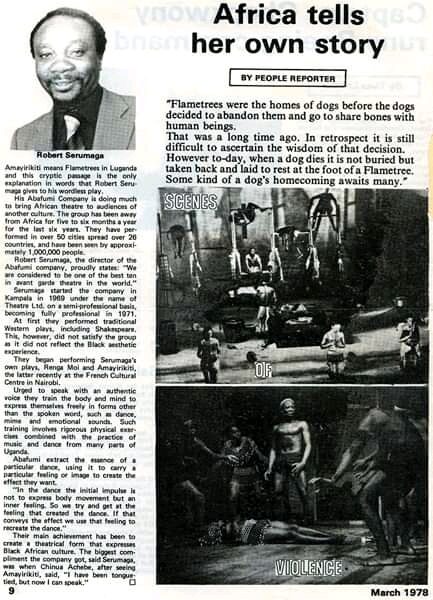
A review of Robert Serumaga’s Amayirikiti in 1978. Photo: The African Theatre Magazine
The late Professor Margret MacPherson of the English Department at Makerere, who worked closely with Serumaga when the latter took a Senior Creative Writing Fellowship at the University, remembers him as ‘a dominant figure on stage with a splendid voice and a considerable sense of timing.’ Serumaga’s first three plays, A Play (1968), The Elephants (1969) and Majangwa (1971), were written during his tenable as a Senior Fellow at Makerere, and produced by Theatre Limited, a company he co-founded in 1969. Theatre Limited (together with Ngoma Players, Makonde, and African Artists Association) completes the list of the first theatre companies in Uganda.
Eurocentric critics of Serumaga indulge in drawing symmetries between his work and Samuel Beckett’s, certainly due to Serumaga’s Irish education at Dublin. A more intimate study of Serumaga’s work, though, reveals a careful negotiation between western avant-garde and African indigeneity. His dramas emerge from the socio-political malaise, and his own matrix as a Ugandan (and very particularly a Buganda nationalist) witnessing the brutish regimes of Obote and Amin and their blatant killing of masses. These are the realities he submerges in Ganda mythology and African ritualism in styles bordering on experimental, dramatic constructs, and deconstructs.
Thus, Majangwa is not a mere story of a man who has lost his virility. The road Majangwa embarks on with his wife, Nakirijja, that promise of rains just like the play’s subtitle reveals, is symbolic. When the characters sleep, dejected and weary, they are awakened by the fact that they are resting at Ttanda, a place on Mityana-Kampala Road, which according to Ganda mythology, has cracks through which Walumbe (Death) went into the Earth’s belly. The drama becomes darker and grimmer when they witness a dead body disposed of in the place. As the two characters say, drawing on their past experiences as former sex performers for paying voyeurs, ‘they are the pus of a very diseased society/ the wound; the opening through which society gets rid of its excess pus.’
To highlight Serumaga’s other sources, we should note, for instance, that Serumaga started rehearsing Majangwa before writing the ending. Three weeks to the 13th of October, 1971 premiere, a Kampala businessman, Michael Kawalya-Kaggwa, was murdered, allegedly by Amin. His body was found in his Mercedes Benz, charred to blackness with a bullet lodged in his heart. Audiences of Majangwa may recall such a dark picture.
The Story of Abafumi – the Storytellers
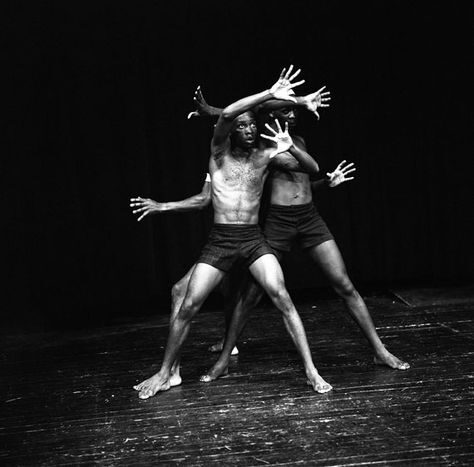
A performance of Mayirikiti at the Mickery Theater in Amsterdam, 1974. Photo: The African Theatre Magazine
Serumaga’s two last plays, Renga Moi (1972) and Amayirikiti (1974) have gorier spectacles. In Renga Moi, the eponymous character is a fierce warrior for Seven Hills, his village. When he begets twins, a priest divines that no blood should be spilled before the cleansing rite of the twins, lest calamity may befall them. The dilemma comes when enemies attack Seven Hills, and Renga Moi decides to go to war. As a result, disasters grip the land. The priest decides that the twins must be sacrificed to restore normalcy. Shortly after, Renga Moi returns from war, victorious and anxious to reunite with his twins. On finding out the truth, Renga Moi avenges the death of his children by killing the diviner-priest, and in a twist, declares himself both the religious and secular leader.
Amayirikiti, on the other hand, is a titular reference to flame trees. The trees are deceptively good looking with beautiful red flowers, at least to the Baganda, for, according to the Ganda ritual explained by Serumaga, ‘when a dog dies, it is not buried. It is placed at the foot of a flame tree and the owner turns his back on it.’ The play opens with limp bodies spread over a scaffold. A lone figure with a glowing candle blows life into the dead bodies and lets them tell their stories, but will, after the 45 minutes of the drama, extinguish the candle and the bodies too. The drama is cryptic; it is non-dialogic, except for the 17 words spoken by a mumbling coffin maker.
Both Renga Moi and Amayirikiti are not scripted. They were the two plays performed by Abafumi, the mutation of Theatre Limited, Serumaga’s theatre company that combined drama schools. It was a group of 14 young actors that Serumaga himself picked straight from school. One of the original Abafumi members is Sweden-based Ugandan actor and filmmaker, Richard Sseruwagi, whom Serumaga spotted in a school production of The Trials of Brother Jero.
The Abafumi (literally meaning storytellers) were taken through rigorous training that included (but was not limited to) voice classes, Stanislavski’s psychoanalytic system, and intense physical activity. Visiting teachers included David Rubadiri and Chinua Achebe, while tours like Renga Moi’s in 1974 in Poland brought them closer to theatre theorists and experimentalists such as Peter Brook and Jerzy Grotowski. Wherever they performed, Abafumi received overwhelming audiences and rave reviews. Having toured over 26 countries in a record 6 years, including the Philippines, Germany, England, and France, Serumaga’s company was, without exaggeration, one of the first Ugandan cultural and theatrical exports to the world.
Thus, in very boundless, parabolic plays that employed minimalistic language and heavy images, Serumaga made an indictment of Uganda’s murderous regimes in a way that made him less confrontational with power. That style was the quintessence of Abafumi. Sseruwagi says they performed Renga Moi at the 1975 OAU summit in Kampala before Amin and other presidents. ‘Although President Mobutu of Zaire walked out in anguish, we really never got into trouble’, Sseruwagi notes. Amin is actually said to have laughed boisterously at Renga Moi’s gymnastic performance on stage. He would later realize, much to his fury, that the laugh was a ‘self-prank.’
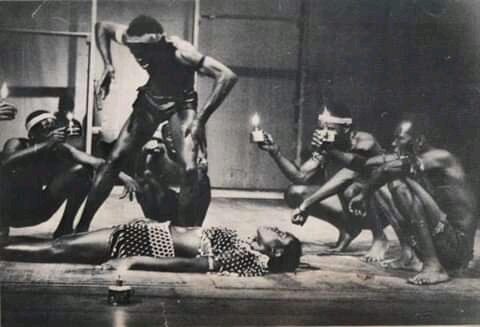
Robert Serumaga’s Amayirikiti, performed by his company, Ababfumi. Photo: The African Theatre Magazine
The Return to the Shadows
The Return to the Shadows is the title of Serumaga’s only novel, published by Heinemann for the African Writers Series in 1969. It is a story of Joe Musizi, a lawyer-cum-businessman, who flees the city for his hometown at the peak of a military coup. His search for safety goes awry when he is intercepted by soldiers on his way and has his car taken by them. He must now continue the tortuous journey on foot. To home. To home-sweet-home. But his hope dims when he finds his family house ransacked and his mother raped. His resolve is to return to the city and fight the junta.
Musizi’s return is quite analogous to Serumaga’s troubled return journeys into the vicious regimes of Obote and Amin; trials that confronted him after school in Ireland, then to exile, back to momentary political normality in 1979 and back to exile, (again!). There was that eerie restlessness. It was an era of terror.
So in 1978, Serumaga and his company, tied what they could easily lay their hands on into headloads, heaped their frightened bodies to a ready lorry, train, and bus on a solitary road to exile. ‘Amin had started planting spies amongst us. A military intelligence officer once came and picked our acting scrapbooks to look for any seditious hints. We knew we were wanted,’ says Sseruwagi.
In exile, Abafumi started working on a new play, Ekikekenke. They had not warmed their seats in Kenya when, about six months later, Kenyan authorities asked them to leave. The authorities said they did not want to collide with Ugandan Government for aiding them. When Abafumi left for a performance tour in Italy, courtesy of the Ford Foundation, they didn’t return. They did not know how to return to the ‘shadows’. They thus got scattered in the wide world of exile. They were lucky to survive the dictator’s guillotine. The company was not. Neither was Serumaga, who lost his life to the silent thunder of death struck from home!
This article was originally published in The African Theatre Magazine. Reposted with permission. Read the original article here.
This post was written by the author in their personal capacity.The opinions expressed in this article are the author’s own and do not reflect the view of The Theatre Times, their staff or collaborators.
This post was written by Ian Kiyingi Muddu.
The views expressed here belong to the author and do not necessarily reflect our views and opinions.

